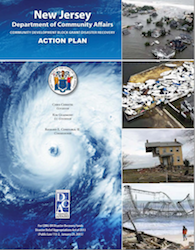New Jersey has created what they term the first of its kind in the U.S. “Energy Resilience Bank” (ERB) to focus on energy resilience. The bank was created in response to the impacts of SuperStorm Sandy where over 8 million people lost electric power in the region – many for several days. The ERB will provide $200 million for municipalities to finance clean resilient power solutions. Projects could include those that “would ensure a highly reliable power supply to critical public facilities such as water and wastewater treatment plants, hospitals, shelters, emergency response centers and transit networks in the event the larger electrical grid fails.”
 On July 23, 2014, the New Jersey Board of Public Utilities approved a sub-recipient agreement with the New Jersey Economic Development Authority to work jointly in the establishment and operation of the ERB. The ERB would be financed through use of $200 million of New Jersey’s second Community Development Block Grant-Disaster Recovery (CDBG-DR) allocation. According to the Governor Christie’s announcement, “the ERB will support the development of distributed energy resources at critical facilities throughout the state …to minimize the potential for future major power outages and increase energy resiliency.”
On July 23, 2014, the New Jersey Board of Public Utilities approved a sub-recipient agreement with the New Jersey Economic Development Authority to work jointly in the establishment and operation of the ERB. The ERB would be financed through use of $200 million of New Jersey’s second Community Development Block Grant-Disaster Recovery (CDBG-DR) allocation. According to the Governor Christie’s announcement, “the ERB will support the development of distributed energy resources at critical facilities throughout the state …to minimize the potential for future major power outages and increase energy resiliency.”
Clean Energy Group’s President, Lewis Milford, applauded the creation of the ERB. “New Jersey has created a model for all states to finance resilient power projects, to protect against power outages during severe weather events. The ERB is an important way for states to finance projects like solar with energy storage in food banks, fire stations, wastewater treatment plants, and schools. It deserves to be a national infrastructure finance model for states around the country.”
The Clean Energy Group is working with states and communities to help deploy more resilient power projects, and the organization cites financing as a remaining a key stumbling block. The New Jersey approach through the new ERB is a model that all states should consider as they deal with increasing problems of severe weather and the power system, problems that are only growing worse, according to Clean Energy Group.

